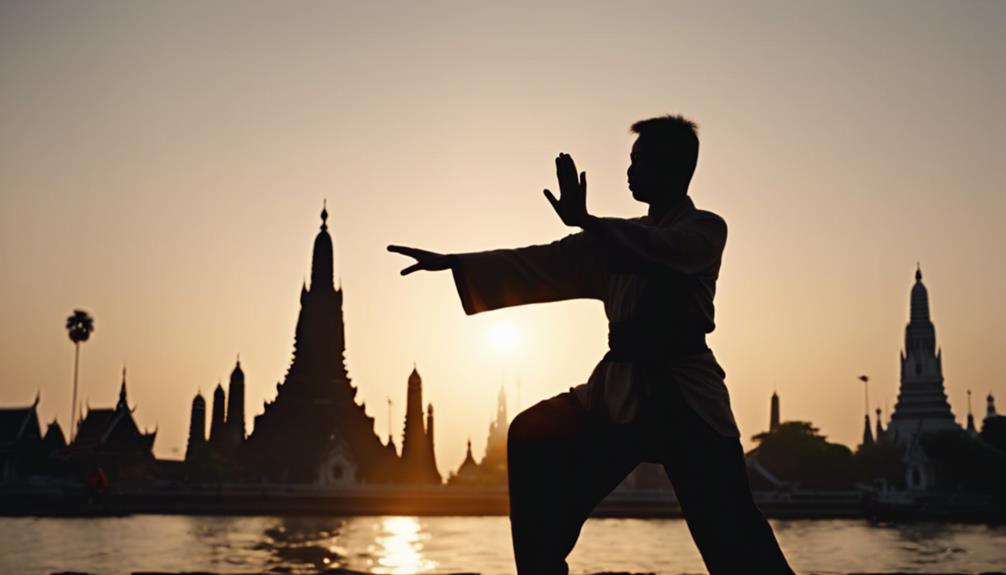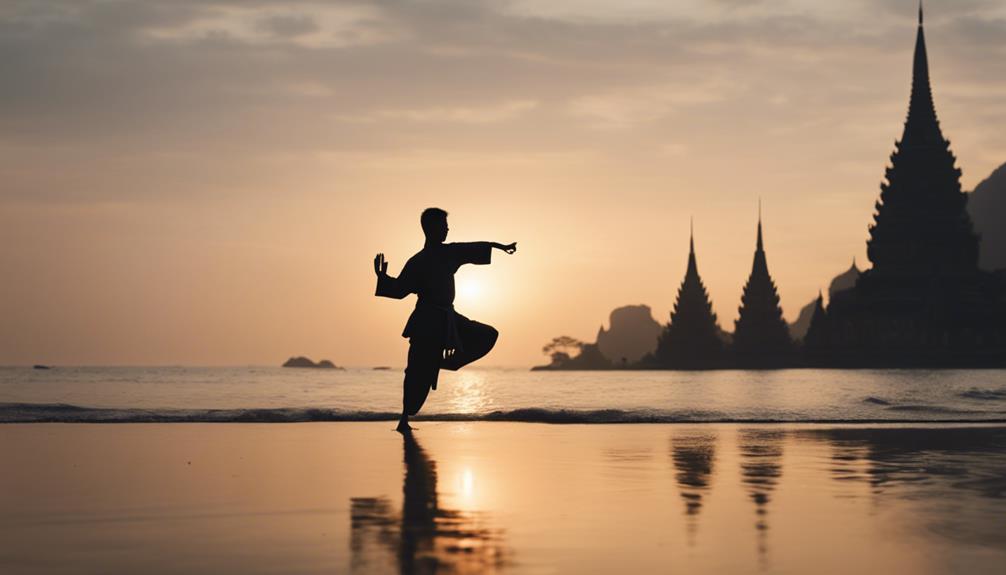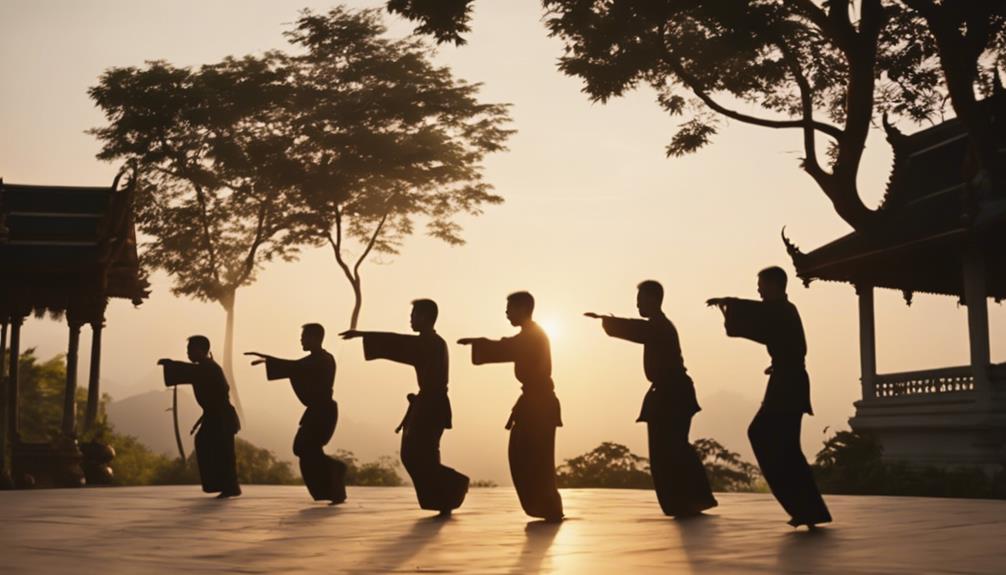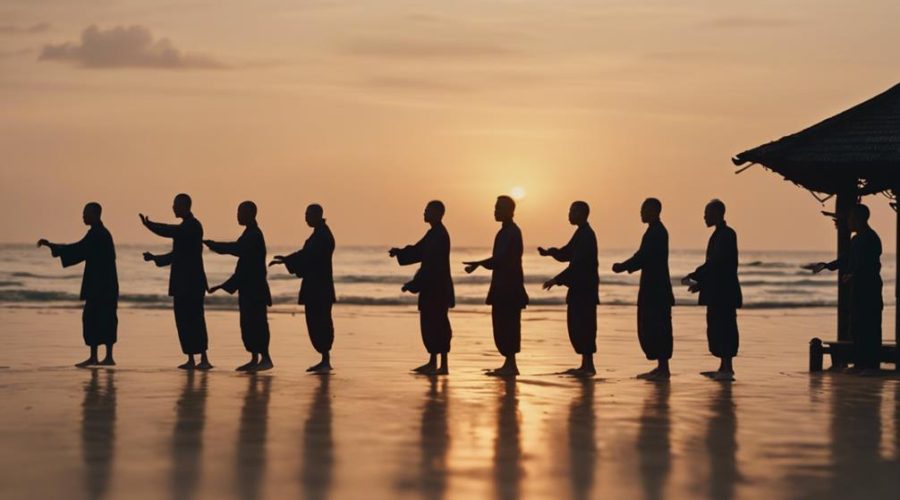Is Tai Chi Practiced in Thailand?
Yes, Tai Chi is indeed practiced in Thailand. Despite its origin in China, Tai Chi has spread globally and Thailand is no exception. It's not as widely pursued as Muay Thai, but its health benefits have gained recognition. Thai Tai Chi schools even add their unique Thai twist to the teachings. The intricacy and mindfulness Tai Chi promotes are appreciated and reflected in Thai culture's emphasis on harmony and balance. So, whether you're an enthusiast or simply curious, there's a lot more to explore regarding how Tai Chi integrates into Thai society.
Key Takeaways
- Tai Chi is practiced in Thailand, highlighting its cross-cultural appeal.
- Tai Chi tourism in Thailand attracts enthusiasts who come to learn from local masters.
- Thai Tai Chi schools combine traditional teachings with a unique Thai twist, promoting cultural exchange.
- Tai Chi is embraced in Thai society for its health benefits, contributing to physical and mental well-being.
- Thai workplaces incorporate Tai Chi sessions into wellness programs, valuing its stress-relieving and productivity-boosting benefits.
Understanding Tai Chi

To truly appreciate whether Tai Chi is practiced in Thailand, you must first understand the essence of this ancient Chinese martial art. Tai Chi's origins are steeped in a rich history that dates back to 13th-century China. It emerged from the philosophical framework of Taoism, embodying its principles of balance, harmony, and the interconnectedness of all things.
Deeply rooted in these fundamental principles, Tai Chi isn't just a form of exercise, but a holistic approach to health and wellbeing. It's a dynamic, flowing practice that cultivates strength, flexibility, and mindfulness. It's about moving energy, or 'Chi', around your body and achieving a state of calm and balance.
Innovation and adaptability are at the heart of Tai Chi's longevity. While respecting its origins, you're encouraged to adapt the movements to your abilities and needs. This makes Tai Chi inherently inclusive and versatile, open to interpretation and personalization. So, as you explore further into this fascinating martial art, remember its essential principles and its innovative spirit. This understanding won't only enrich your appreciation of Tai Chi but also provide a solid foundation as we investigate its presence in Thailand.
The Spread of Tai Chi Worldwide
You've understood the basics of Tai Chi, now let's explore its global influence. As you'll see, this ancient art form has spread far beyond its Chinese origins, with a significant footprint even in countries like Thailand.
From its Asian heartlands to the broader international stage, Tai Chi's journey is a fascinating one.
Global Tai Chi Influence
Tai Chi's influence has spread globally, with practitioners found even in the heart of Thailand, demonstrating the art's cross-cultural appeal and universal resonance. This cultural adaptation has been driven by three key trends:
- The increase in Tai Chi competitions, fostering a sense of community among practitioners worldwide.
- The rise of digital platforms, amplifying the reach of Tai Chi teachings.
- The integration of Tai Chi into wellness programs, highlighting its health benefits.
These trends have collectively expanded Tai Chi's global footprint, making it accessible to diverse cultures. You'll find people from all walks of life embracing this ancient Chinese art, showcasing its universal appeal.
Tai Chi in Asia
In your journey across Asia, you'll find Tai Chi deeply ingrained in various cultures, reflecting its widespread adoption and universal appeal. This ancient martial art's evolution is a testament to its adaptability, continually molding itself to fit each society's unique context.
From the bustling parks of Beijing to the tranquil temples of Thailand, Tai Chi's cultural adaptations are on full display. It's more than just a form of exercise; it's a vehicle for cultural expression. You'll see how the practice has evolved, adopting local nuances without losing its core essence.
This Tai Chi evolution encapsulates Asia's rich diversity, reminding us that innovation is born of tradition. So as you explore Asia, keep an eye out for Tai Chi – you'll be witnessing centuries of history unfolding before you.
Tai Chi in Southeast Asia

Despite its Chinese origins, you'll find Tai Chi has a significant presence throughout Southeast Asia, including Thailand. This ancient martial art has spread far beyond China's borders, integrating into the fabric of Southeast Asian martial arts.
- Tai Chi tourism has become a significant trend, drawing enthusiasts to the region to learn from local masters. From immersive retreats in serene landscapes to city-based classes, travelers have an array of options to deepen their practice.
- Tai Chi has been seamlessly woven into the diverse tapestry of Southeast Asian martial arts. The slow, meditative movements of Tai Chi contrast and complement the dynamic, high-energy styles typical of the region, creating a balanced martial arts ecosystem.
- The growing popularity of Tai Chi has triggered a surge in local interest. More Southeast Asians, and Thais in particular, are embracing Tai Chi for its health benefits and spiritual depth.
In a world increasingly seeking mindfulness and balance, Tai Chi offers a path to both. Its growth in Southeast Asia reflects the art's adaptable, inclusive nature. Whether you're a martial arts enthusiast, a health-conscious individual, or simply curious, Tai Chi in Southeast Asia has something to offer you.
Tai Chi's Presence in Thailand
You might be wondering about Tai Chi's presence in Thailand.
Well, you'll find it's quite popular, largely due to the recognized health benefits of this ancient practice.
A number of Thai Tai Chi schools are also contributing to its growing popularity among locals and tourists alike.
Popularity of Tai Chi
Surprisingly, Tai Chi isn't as popular in Thailand as one might expect, given the country's deep roots in martial arts and spirituality. Despite Tai Chi's evolution into a relaxing, meditative practice, it hasn't gained as much traction in Thailand.
Here are three reasons for this trend:
- Martial arts comparison: Thai people are more inclined towards their traditional martial art, Muay Thai, which has a more aggressive, competitive nature compared to the slow, fluid movements of Tai Chi.
- Lack of exposure: Tai Chi isn't prominently featured in Thai culture or media, which influences its popularity.
- Differences in spiritual practices: Although both Tai Chi and Thai spirituality stress balance and harmony, their methods and philosophies are vastly different, which may affect Tai Chi's appeal.
Tai Chi's Health Benefits
Even though Tai Chi isn't as widespread in Thailand, it's worth noting the significant health benefits it offers, which might inspire more Thai people to embrace this practice. Regular Tai Chi practice can foster mental calmness, reducing stress and anxiety, while improving concentration and mindfulness. It's an innovative way to cultivate inner tranquility amidst today's hectic lifestyle.
Moreover, Tai Chi is often associated with aging gracefully. Its gentle yet effective movements promote joint health, flexibility, and balance, critical for maintaining mobility and independence in later years. Evidence suggests that it may also boost cardiovascular health, immunity, and overall well-being. So, if you're in Thailand and seeking a holistic approach to health, why not consider Tai Chi? It's an investment in lifelong wellness.
Thai Tai Chi Schools
Despite its relatively low profile, there are indeed schools and institutions in Thailand that offer Tai Chi classes for those inclined to learn this ancient art. These schools combine traditional Chinese teachings with a unique Thai twist. Here are three points showcasing the presence of Tai Chi in Thailand:
- Incorporation of Chi fashion: Most schools encourage students to don traditional Chi attire, fostering a sense of unity and respect towards the art.
- Adoption of Chi cuisine: Some institutions offer Chi cuisine as part of the holistic experience. They believe in nourishing the body in a way that complements the Tai Chi lifestyle.
- Promotion of cultural exchange: You'll find that these schools actively promote cross-cultural exchange, helping to further enrich your Tai Chi experience.
These Thai Tai Chi schools are, thus, taking innovative steps to keep the tradition alive while adapting to modern tastes.
Impact of Tai Chi on Thai Society
In the heart of Thai society, Tai Chi has made a significant impact, transforming not just physical health but also mental well-being. The societal acceptance of this ancient Chinese martial art is phenomenal. It's not just seen as a trendy fitness regimen. It has been embraced as a means to better health, balance, and mindfulness.
Cultural integration plays a big part in this acceptance. Tai Chi's principles align well with Buddhism, Thailand's predominant religion. Its emphasis on inner calm, harmony, and balance resonate with Thai values, making it a good fit for locals.
Moreover, Tai Chi has also influenced the tourism industry, attracting wellness enthusiasts from around the world. It's become a part of the Thai wellness scene, contributing to the growth of health tourism.
In workplaces, Tai Chi is promoted as a stress-reliever and productivity booster. Companies are incorporating Tai Chi sessions into their wellness programs, recognizing the benefits it brings to their employees' mental and physical health.
Thai Perspectives on Tai Chi

Understanding Thai perspectives on Tai Chi reveals a deep appreciation and respect for this martial art as more than just a form of exercise. For Thais, Tai Chi is a blend of movement, meditation, and philosophy that resonates with their cultural beliefs and practices.
- Cultural Acceptance: The graceful, slow movements of Tai Chi align well with the Thai culture's emphasis on harmony and balance. It's not simply viewed as a physical activity but is seen as a spiritual practice, akin to their traditional meditations.
- Chi Philosophy: Thais have a profound understanding of the Chi philosophy, which is central to Tai Chi. The concept of Chi, or life force, is deeply embedded in their cultural and spiritual systems. They believe that Tai Chi helps harmonize this energy, promoting health and vitality.
- Health and Wellness: As health awareness grows in Thailand, so does the popularity of Tai Chi. Thais see it as a holistic practice that enhances both mental and physical wellness, making it a valuable addition to their daily routines.
Innovation doesn't always mean creating something new. Sometimes, it involves embracing practices from other cultures, like Tai Chi, and integrating them into one's own — a reflection of Thai's openness and adaptability.



